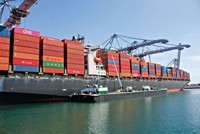Advertisement
Grab your lab coat. Let's get started
Welcome!
Welcome!
Create an account below to get 6 C&EN articles per month, receive newsletters and more - all free.
It seems this is your first time logging in online. Please enter the following information to continue.
As an ACS member you automatically get access to this site. All we need is few more details to create your reading experience.
Not you? Sign in with a different account.
Not you? Sign in with a different account.
ERROR 1
ERROR 1
ERROR 2
ERROR 2
ERROR 2
ERROR 2
ERROR 2
Password and Confirm password must match.
If you have an ACS member number, please enter it here so we can link this account to your membership. (optional)
ERROR 2
ACS values your privacy. By submitting your information, you are gaining access to C&EN and subscribing to our weekly newsletter. We use the information you provide to make your reading experience better, and we will never sell your data to third party members.
Policy
U.S.-Oman Pact Expands Free Trade
by Glenn Hess
January 5, 2009
| A version of this story appeared in
Volume 87, Issue 1
A free-trade agreement between the U.S. and oil-rich Oman took effect on Jan. 1, eliminating tariff barriers on all consumer and industrial products, including chemicals. The trade pact also provides strong protections for U.S. businesses with investments in Oman, such as Dow and Occidental. "We have worked closely with the government of Oman to ensure that the obligations and responsibilities of each party under the agreement have been met," U.S. Trade Representative Susan C. Schwab said in a statement. In addition to making all two-way trade between the countries duty-free, Schwab said the deal establishes a "secure, predictable legal framework" for U.S. investors operating in Oman. It also provides for effective enforcement of labor and environmental laws and enhances the protection of intellectual property, according to Schwab. The U.S. has similar free-trade agreements with Israel, Jordan, Morocco, and Bahrain. The American Chemistry Council calls the U.S.-Oman pact a "building block" to a larger free-trade area that can lead to economic and political stability in the region and help alleviate current U.S. energy challenges. The Middle East, an area of almost 330 million people, has a $158 billion trading relationship with the U.S.






Join the conversation
Contact the reporter
Submit a Letter to the Editor for publication
Engage with us on Twitter